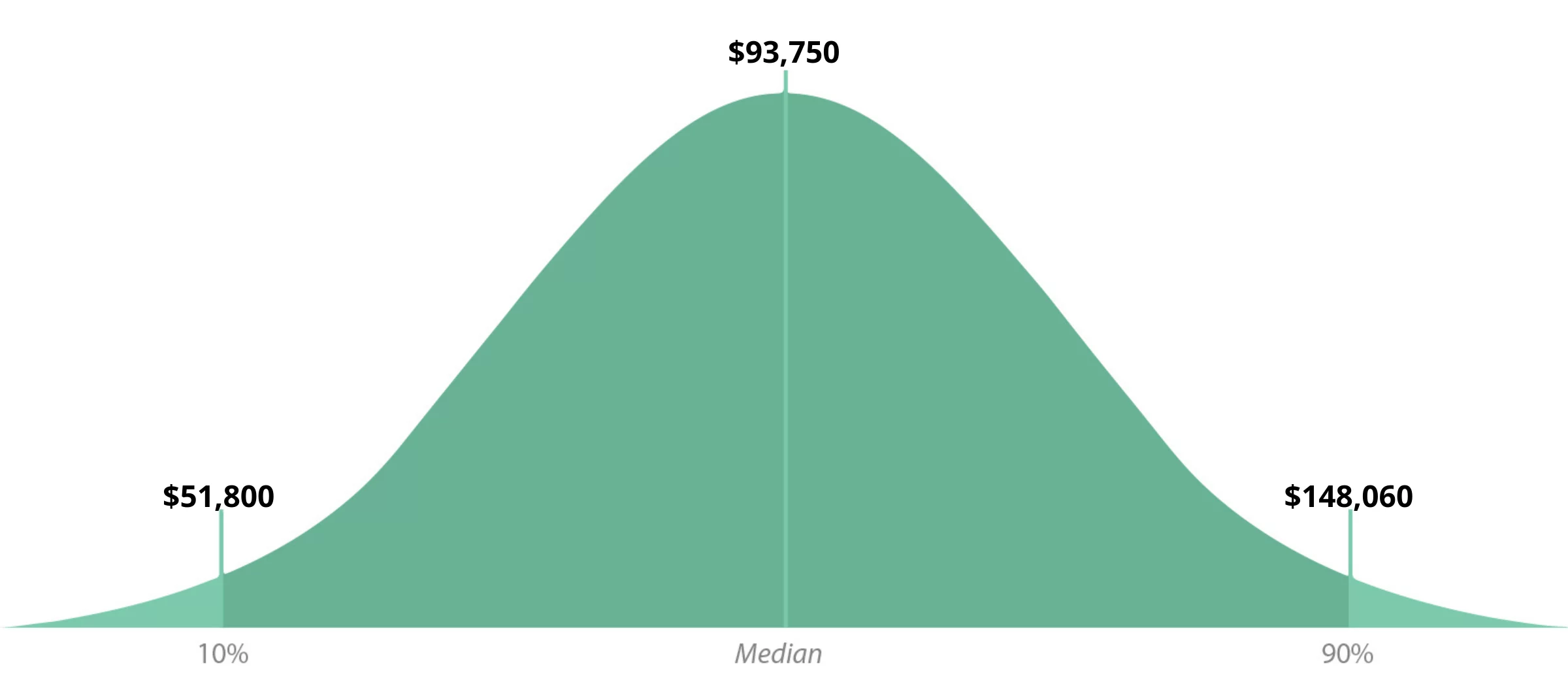
1. Overview: Job Responsibilities, Salary, and Common Requirements
2. A Comprehensive Guide to Becoming a Database Administrator
3. What Does a Database Administrator Do?
4. Signs You Should Consider Becoming a Database Administrator
5. Reasons Why You Should Consider Becoming a Database Administrator
6. How Do You Become a Database Administrator?
7. What are the Knowledge and Skills Needed to be a Database Administrator?
8. Popular Schools and Colleges in the U.S. for Aspiring Database Administrators
9. How to Get a Job as a Database Administrator
10. Learn About Geographic and Location Pay Differentials
11. Make Your Resume Stand Out
Database Administrators made a median salary of $93,750 in 2019. The best-paid 10 percent made $148,060 that year, while the lowest-paid 10 percent made $51,800.

Computer and Information Systems Managers
Computer Programmers
Computer Support Specialists
Computer Systems Analysts
Network and Computer Systems Administrators
Operations Research Analysts
SQL
Powershell
Linux
MySQL
Microsoft SQL Server Oracle 11g
IBM
DB2
Sybase
Analytical skills
Communication skills
With all of the latest innovations in this digital age, every company has since then utilized at least one into their processes from time to time. The blessings of technological progression have made different businesses delve into the modern practices to incorporate them with their goals of a boosted productivity. The absolute increase in the usage of computers, technologies, and various software has made them call for the need of people who will handle the management and security of all of the data they need. This is where the database administrators come to the scene. They will be the one manning the database to ensure these technologies coordinate well with how companies want their systems to function.
As data increases every day, the need for database administrators definitely expands. To be a successful database administrator, one should have a genuine passion for technology as the field is fast-moving and highly dynamic.
Database administrators or DBAs make sure that a company’s database function properly and users can easily utilize the information from the database. Companies rely on them to install software and manage their respective database systems. DBAs manage, back up and maintain the database for the purpose of operational efficiency. They also serve as the main keepers of the data to secure it from any unauthorized access.
A database administrator’s duties may include:
Database administrators’ best friend is technology. It is what makes them tick. And if you are one of those people who can’t stand being left out when a new technology hits the market, then you are a good fit to be a DBA.
With the ever fast-changing world of technology, it is an essential trait of a DBA to dive deep into the new things and learn how to efficiently incorporate these in his job. They are hungry for new knowledge of the latest innovations because if they don’t, they will be left stagnant at their current systems and miss out on new ideas that will benefit their processes.
Having assigned to the technical aspects of the companies’ systems, database administrators must possess top-notch troubleshooting skills. They are expected to deliver these skills any time of the day in time of need. So if you enjoy performing troubleshooting, you will certainly fall for being a database administrator.
Do you have a penchant for solving problems? If you are a person who is always up for a challenge, being a database administrator might suit you. Often, they are required to fully utilize their analytical skills in designing resolutions in times of need. There may be times that they are consulted about problems that may be out of their grasp, but they will be more than happy to jump right in and propose a solution.
What makes database administrators successful is their strong attention to details—however big or small they could be. Double checking and triple checking tasks are innate to them. They anticipate errors ahead of time and ensure a scheme is already planned out just in case the unexpected comes. Since their job is highly critical for the company, they should own up the initiative to make sure the database functions properly through their systematic monitoring.
Database administrators make significant decisions on processes they undertake. They are assigned to be in charge of the tasks and often treated as a leader of the team. It is essential for them to swiftly weigh in things according to what will work best. Understanding of the whole scope of the situation will help them produce logical decisions.
Being on the lead with technical aspects of the database, pressure is a regular cause of one’s internal disorganization. If you can keep calm when things go chaotic, you are a perfect fit for becoming a database administrator. Faced with the huge task of ensuring everything works fine, a gigantic load of responsibility is weighing on DBAs’ shoulders. It’s up to them on how they are going to take it, but succumbing to pressure doesn’t have a place in their job definitely.
Good communication skills are a prerequisite for outstanding database administrators. They have the role of communicating with the higher-ups when reporting any issues regarding their tasks. On the other hand, they also have a role to pass down any important announcement or information to anyone who has access to the database. Often, they serve as the go-to person when there are technical difficulties in the system, so being approachable and able to share information clearly are a must to them.
When it comes to deciding which profession to pursue, it will always come down to one’s preference. But the exciting perks of being a DBA can be enough to convince someone on becoming one.
Here are some reasons to help you decide why you should be DBA:
With the growing data needs of companies in all sectors, someone will always have to administer and maintain those data. Things are looking up for aspiring DBAs as employment is projected to shoot up by 10% from 2019 to 2029 according to the Bureau of Labor Statistics. That is faster than the average for all other professions.
Being a DBA is a highly rewarding profession. It is even ranked fourth in US News’ Best Technology Jobs of 2020. The median annual wage for DBAs in 2019 was $93,750 and the job offers growth opportunities and wage is increasing.
If you are worried about possible employment lay-off, being a DBA can guarantee you a security of your job. As DBAs are highly elemental in the processes of companies, they cannot be replaced easily. Once proven with the expertise and strong skill sets, companies wouldn’t even think of letting you slip out of their hands. You can demand job security because of your value in the organization.
Intellectuals like DBAs take pleasure in working on highly analytical tasks rather than repetitively tedious jobs. They like to be challenged on intricate problems as they are born with innate problem-solving abilities. Critical thinking is a major requirement for the job—you can expect to get a thrilling experience as a DBA.
Working in an office-based setting might be stressful for a DBA as the work is highly demanding. Instances like database failure, system glitches, and always on-call responsibility are some of the reasons why a DBA can easily be put in distress. But the nagging stress can be avoided through Remote DBA Services. Some companies offer remote employment which is convenient for any DBA who wants to manage his time effectively without having to sacrifice his career.

Most database administrators have completed a bachelor’s degree in any computer-related programs that concentrate on computer information systems and database management such as computer science and information technology. The 4-year educational background gives the edge in knowledge with the essentials of being a DBA. It covers the topics of data structure, database systems, database structure, database management systems, and data security.
Employers require database administrators to have at least a bachelor’s degree in a computer- or technology-related program. Here are the two common majors:
This degree covers the prerequisites you’ll need in the pursuit of becoming a database administrator. It provides fundamental knowledge of data management, computer architecture, logic design programming languages, and network fundamentals.
This program provides good coverage of the system and network administration, website technology, computer security, and system architecture.
Additionally, a master’s degree concentrating on database management displays a great chance of getting hired as a DBA.
It is a great step towards becoming a DBA as you will be faced with real-world examples and situations of how the job works. It will boost your knowledge and increase your skills that are going to be vital on the job. It is also a good time to find mentors and connections who will be there to guide and help you along the way for possible employment in the future.
There are a lot of disciplines included in managing a database, thus, specialization of a single scope may be a good choice for an aspiring DBA. As the job requires extensive knowledge in troubleshooting, database setup and monitoring, database design, database security, data migration, database efficiency evaluation, and a whole lot more, DBAs should take into consideration if they are going to get involved in everything or master a few specific specializations.
Aside from being a general database administrator, a DBA can specialize in the following disciplines:
A database architect is in charge of the overall design and execution of database systems. He identifies the user and business needs in order to plot the best database structure that would work for the business.
A database architect’s duties may include the following tasks:
A System DBA is concentrated on administrative tasks such as installing and maintaining the database servers. He has a background in the system structure and the responsibility for the maintenance of the physical and technical features of the system.
A system DBA’s duties may include the following tasks:
An Application DBA is concentrated on using programming languages in order to debug any issues with the database. He oversees the applications being used and are properly coordinated with the system to achieve maximum productivity.
An Application DBA’s duties may include the following tasks:
A performance analyst concentrates on the overall performance of the database. He is responsible for monitoring and resolving bottlenecks that affect the database performance. He should be knowledgeable in the technical aspects of advanced database ideas.
A performance analyst’s duties may include the following tasks:
It is a must for DBAs to undergo training and finally get certified by their chosen software vendor. A certification will be granted after passing a series of tests and requirements. This will support their strong knowledge and background in the software being specialized. A lot of companies require their DBAs to be certified to ensure the competency of the DBA hired.
The certifications to improve your credentials in becoming a database administrator in 2020:

Knowing the database structure is the very foundation of data management. You should be able to identify the needed data to be stored, the overall structure of the data, and the optimization processes in order to fully ensure an efficient database. You should be able to conceptualize and design an efficient database from the given specifications and data.
It is requisite to know the components involved in managing database which include the networks, computer architecture and processors, storage, and application server operation for a better understanding of how to execute important processes.
Implementing a backup and recovery procedure is every DBA’s responsibility in case of any unforeseen database errors occurs. This is a mandatory step to ensure a continuous productivity and integrity of the database.
It is a DBA’s sole responsibility to implement performance tune-ups when faced with any technical problems of the database. You are in charge of monitoring of the system to identify the needed changes in data structure, SQL, application processes or any factor that will improve performance.
Extensive knowledge in SQL is another mandatory skill of being a DBA. Structured Query Language or SQL is used to communicate with a database. Having said that, you must be proficient in it as it is used in basically everything that concerns the database. It is utilized to perform updates, do patches and fixes, and retrieve data. It is the standard language for Relational Database Management Systems or RDBMS which include Oracle, Sybase, Microsoft SQL Server, and IBM DB2.
Data integrity is the assurance of a consistent and accurate data performance through systematic maintenance. It is a crucial role in taking the task of a DBA as it requires immense warranty that all data recorded are kept unchanged during storage in the database.
Ensuring the database is only accessible by authorized users is one of the required commitments of a DBA. You should be able to design a security routine that would hold together the safety of all the data from any unforeseen threats.
UNIX is a multi-user, multi-tasking OS interface made by The Open Group. It is written in the C programming language, which is used in the organizational foundation for some systems of Mac, Android, Chrome, and PlayStation. It is crucial to learn as it consists of the essential building block for database management and administration.
This open-source operating system offers versatility over the control of several computer systems like smartphones and supercomputers. Linux is an essential requirement to master since you’ll need this in creating comprehensive platforms for clients and companies you’ll work with.
Oracle is a relational database framework oriented through SQL. Its primary purposes are providing access and organizing datasets. It works with major platforms like Windows, Mac OS, UNIX, and Linux. Oracle IDE also offers a user-friendly interface and powerful features to efficiently access, organize, and manipulate datasets within the Oracle relational database framework.
The most widely used system globally is the Windows OS. It is the orienting graphic interface for all Microsoft products. Unlike Linux and UNIX, Windows OS is not openly accessible and is corporately owned.
A critical hard skill needed in database administration is data analysis. Database administrators are expected to inspect, collate, and interpret data into information that’s easy to comprehend from the clients’ and companies’ perspective.
In your data analysis, Microsoft Access will be your best tool to manage every data. It is best for referencing, reporting, and data analysis. The management tool eases up the process of making datasets searchable and usable.
Hypertext Markup Language or HTML is the standard markup language in web page creation. It is a crucial subject for database administration as it describes the structure of a web page. It serves as the foundation of computer programming, requiring database administrators to understand it fully.
Below is a list of the top 50 Universities that excel in the field of Computer Science & Information Systems according to QS World University Rankings:

Becoming a DBA is not an easy task. The role is highly analytical which demands radical thinkers who have proven expertise in the field. To be one is rather demanding as it handles a great number of responsibilities, but it definitely is a fulfilling job. If you really want to pursue a career on this field, we are here to help you out on securing that coveted role.
With the gift of latest technology, applying for a job is easier through online job portals. It is convenient and practical on both ends of the employers and applicants. Look up your desired job position on these portals and feel free to send out applications to your prospective employers.
You may want to check out job postings on these websites:
Career fairs are a great platform to scout for job opportunities. These caravans happen every once in a while on various locations across the country. As these are pre-scheduled, you have an ample time to review the companies and the job openings ahead of time.
Being well-prepared prior the event, you have the advantage of making a good impression with interviewers.
A DBA’s salary is highly competitive among all other professions. A lot of DBAs may have chosen to take this path because of the rewarding compensation which makes sense in all aspects. But a DBA’s median and averages wages vary significantly by state..
Below is a report of the mean annual wages of DBAs in different states across the US dated May 2019 as per the Bureau of Labor Statistics.
Report from the Bureau of Labor Statistics
Odds are more likely to be in your favor when you have crafted a comprehensive resume that showcases your strong background in the field of database administration. A well-polished resume that highlights your scope of specialization, educational background and accomplishments will help you leave a remarkable impression with potential employers.
Make sure to include the following information on your resume for higher chance of getting hired as a DBA:
Certifications play a big role in landing a job as a DBA. Employers would prefer hiring someone who has relevant knowledge and experience in the current software they are using. So list down all of the certifications you have earned from software distributors to make sure that you are in line with the company’s current operational systems.
Here are some major database certifications you can include in your list:
A good timeline of working experience as an IT professional displays a strong picture of how responsible and knowledgeable you are as an employee. In reverse chronological order, list down all the companies, software, operational systems and other relevant responsibilities you have handled in the past. A specific rundown of all the details will help you get noteworthy remarks from employers.
Now’s your time to impress the hiring manager by listing down some of the milestones you have achieved from your past works. A list of accomplishments could match your potential company’s goals and needs which will set you apart from all other candidates. You can include the tasks you have handled and quantify your previous responsibilities.
Always include your educational history in your resume. Aside from the academic years, you can also include the trainings attended that furthered your knowledge and skills in your expertise. While a master’s degree will help you jump ahead, it is an optional route to take for DBAs.
Since you already have established a career in the field, it is expected that you have made a few connections. You can include organizations and people who can attest to your IT competency. Listing them down will look good on your resume to demonstrate a reliable and strong set of credentials.
Even with proven years of experience in the field, interview will always be a prerequisite on securing a job. No matter how long you have worked, there is no excuse for not having an interview. Some may feel anxious about having a face-to-face meeting, but you have to remember that this is a great opportunity to discuss your abilities and skill sets that are valuable to potential employers. So as much as you can, prepare for the assessment and make sure you present yourself well.
Have these pointers in mind when getting ready for your most awaited interview to eliminate any blunders:
Aside from the common interview questions, be ready for technical questions that could be thrown your way. These are some of the technical questions you must watch out for:
This question is asked to initially know your knowledge and experience with managing a database. The employer wants to know if your expertise match the needs of the company. As every company uses a variety of database versions, it is important to find the person who can handle their existing database with mastery.
To answer this, just enumerate all of the database versions you have worked on. Remember to be honest and just mention those you are confidently proficient with. You can support your answers by sharing the duration of work you had and giving a brief overview of related tasks with it.
If the company you are applying for deals with huge amounts of data, they will need someone who has proven practice with managing such amount. If you have handled a great number of database servers in the past, you won’t have any problem answering this particular question. But if you are the one who has to prove yet your expertise, worry not because you still can convince them to take a chance on you.
You just have to share the size of the company you worked for. From there, continue by telling how many servers were utilized and what types were they. As long as they can gauge that you are confident enough to handle a bigger load, they will definitely consider you for the job.
This question wants to know your capability to handle stress-inducing circumstances such as this. They want to see your strategy to overcome such distressing situation.
Remember that as a database administrator, you always have to possess a level-headed attitude. Come up with an answer that would show the steps you’d take in order to get everything under control. These circumstances happen every once and a while so acknowledge it as if it is a foreseen situation. You can share your past experience with similar troubles and describe how you dealt with it.
A database administrator, you will be performing troubleshooting quite often. You are also tasked to find issues before they even arise, so someone who has an eye for detail is highly needed.
On this question, be able to share your process on addressing technical difficulties. The employers want to look into how you digest everything that’s served on your plate. Talk about the past difficulties you have encountered and share the steps you took to get the resolution. Also, acknowledge your willingness to put the available resources into use when troubleshooting.
Discussing what’s already written on your resume will be repetitive and a waste of time for the interviewer. Rather than focusing on what the interviewer may already know about you, shed light on things that are not in your resume such as your interests, trainings, details about your provided skill sets, or anything that will display your high regard for the role. This will help the interviewer gauge your personality as a person and your genuine interest in the IT field.
Prior to the interview, do a research of the company overview to know what kind of business they engage in. From there, you should be able to match your own skill sets with what the job demands. Emphasize your knowledge and expertise to amplify your given credentials.
Listing down your skills and abilities may not be enough for employees to see how good you are, some may ask you to elaborate them. Ensure that you can provide supporting situations that would verify those niches.
Employers always ask if you have a question regarding the application to measure your eagerness to get the job. Prepare a few questions that concern the company and some issues that confuse you. This way, you are not only letting the company know you are invested in knowing them, you are also obtaining information on how you can get around with the tasks.
Lastly, keep in mind that physical attributes may also affect your application so be sure that you are put together on the day of the interview. Dress appropriately and behave well during the evaluation. Embody an approachable character and make sure that your body language doesn’t contradict your message.
With all these in mind, we can guarantee that you are just a few steps away from securing that coveted role of a database administrator. On top of your credentials, all you need to instill is a sound mind and confident disposition to make you get ahead among everyone else.
Sharpen your skills in database administration by taking these top online courses
To help any aspiring database administrator get started, here are some of the top online courses he can take up on his own.









